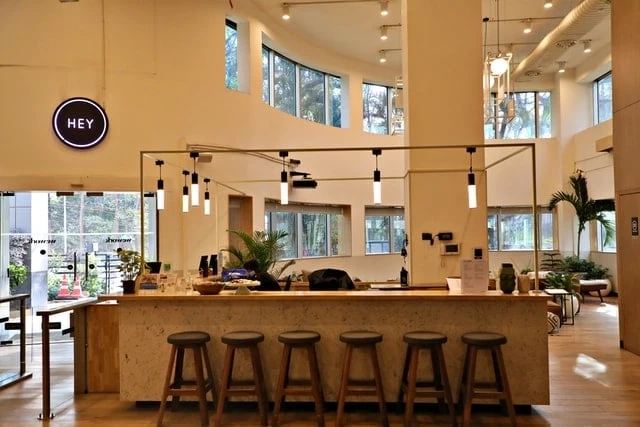The future of work has been widely debated. Work-from-home has shifted the traditional 9-to-5 office work routine, blurring the lines between work and play. While the office fellowship is missed, prolonged indoor time has highlighted the importance of work-life balance, resilience, belonging to a society, and a strong work culture. Shared office space is used by occupants to increase portfolio flexibility, reduce tenancy costs, and foster collaboration. The most common are coworking, administrators, and incubators. Downtowns or dense neighbourhoods have more coworking spaces, while cities have more directories near major employment hubs. The traditional, functional office space is giving way to a social, collaborative, and relationship-building workspace. In the future of work, more emphasis will be placed on technology and spaces that foster human interaction. Flexible workspaces have helped businesses and employees adapt to the ‘new normal' by allowing them to move quickly. Flexible workspaces allow companies to test new trends like working from home or from anywhere in the city with a one-day pass. This saves time and money, provides an office-like atmosphere, and allows more time with loved ones.
Businesses adopt flexible workplace models for many reasons, including:
Cost Reduction: Purchasing/Leasing office space can be a huge expense that hits the bottom line. Replacing flexible office space in multiple cities can be much more profitable. Flex spaces are extremely cost-effective and accessible in these rare times. It is cheaper and suitable for businesses as they can pool and share the rental costs. To stay afloat, they can direct their expenses and resources into other areas of their business.
Collaborative Hubs: Collaboration is vital in business. Various departments must work closely together to ensure smooth and efficient operations. Some joint efforts can be done via Facetime, email, or instant messenger, but it's often easier to work together in person. Flexible office space allows businesses to gather employees as needed. Personal interaction is often more productive than working within the confines of a digital platform.
Flexible lease terms allow businesses to account for uncertain times. Single office spaces require rigid seven- to fifteen-year lease agreements, making it difficult to stay flexible. However, with flex spaces, the lease agreements can be as short as a few months or as long as the business requires. They also allow businesses to change their warehouse or office space to accommodate growth or contraction. In a leasehold space, long and strict lease terms can get a company into trouble. Moving to a lower serviced office may be the better option due to the shorter lease terms.
Convenient: Flexible workspaces offer convenient membership options, ready-to-move-in preparations, virtual office tours, and user-friendly designs. With no permanent floor, businesses can climb and expand their presence in new markets. They also provide a centralized solution for legal and IT needs, allowing companies to focus on hiring and innovation. With strength and safety in mind, many flexible workspace providers have implemented strict measures like sanitization and social isolation.
Networking: Flexible office spaces help startup teams thrive by surrounding you and your coworkers with a creative and driven professional community. Startup founders can benefit from networking with other entrepreneurs to build valuable connections. Flexible office spaces plan events to foster a sense of community among their tenants. Your team can benefit from networking opportunities such as meetups and client speakers. Some coworking spaces have programmes to help early-stage startups quickly measure. Commitment to these incubator-like environments often includes resources to help members develop faster.
Reduced Carbon Footprint: Having smaller offices spread out across the country saves energy and other costs. A shorter commute means fewer cars on the road and less energy used, unwittingly helping to clean up our environment and reduce our carbon footprint, both of which are urgently needed.
Flex spaces
Flex spaces fill in this void by allowing organisations to adopt remote-first policies and reshape their market position. They even provide a network of workspaces for employees both inside and outside of downtown. Using this concept, an organisation can create a hybrid functional model that allows employees to choose the workspace that best suits their needs and promotes collaboration. Today's workers can work from coffee shops and libraries. Now, working hours are flexible and exposed to new environments. Starting flexible workspaces with subject and multifunctional rooms, hybrid workplace models, and well-equipped spaces trumps traditional 9-to-5 and pragmatic workspaces.
Modern workers
Modern workers can perform better, learn more, and collaborate better when companies and communal workspaces support their desire to do their jobs well. Many employees and businesses prefer the flexible workspace model. It's more important than ever to remember what workers want, and what companies can gain from: flexibility.


